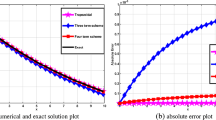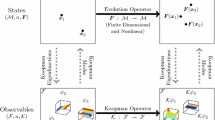Abstract
We look at the task of computing the time-evolution of a non-linear system for a long time, in our case under random external influences. Our specific example is the fatigue evaluation of a wind turbine. To facilitate such a computation, we look at a reduction of the computational effort by projecting everything on a low-dimensional basis. In this case we take the Karhunen-Loève basis generated from running the model a little while under the random loading. It is important that the error which is caused by this reduction process can be controlled. We estimate the error by dual or adjoint methods. This in turn allows the process of model reduction to be performed adaptively.
Similar content being viewed by others
Author information
Authors and Affiliations
Additional information
Dedicated to the memory of Prof. Mike Crisfield, for his cheerfulness and cooperation as a colleague and friend over many years.
Rights and permissions
About this article
Cite this article
Meyer, M., Matthies, H. Efficient model reduction in non-linear dynamics using the Karhunen-Loève expansion and dual-weighted-residual methods. Computational Mechanics 31, 179–191 (2003). https://doi.org/10.1007/s00466-002-0404-1
Issue Date:
DOI: https://doi.org/10.1007/s00466-002-0404-1




